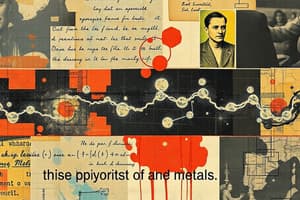Podcast
Questions and Answers
What happens when potassium is added to water?
What happens when potassium is added to water?
- It sinks and melts into a ball
- It fizzles without reaction
- It explodes with a lilac flame (correct)
- It floats and dissolves slowly
Iron oxide is a more reactive metal than aluminum.
Iron oxide is a more reactive metal than aluminum.
False (B)
What kind of reactions do metals that are more reactive perform with less reactive metals?
What kind of reactions do metals that are more reactive perform with less reactive metals?
Displacement reactions
When metals react with oxygen, magnesium burns with a __________ flame.
When metals react with oxygen, magnesium burns with a __________ flame.
Match the metal with its reaction with water:
Match the metal with its reaction with water:
Which of the following is NOT a sign of a chemical reaction?
Which of the following is NOT a sign of a chemical reaction?
Metals are generally poor conductors of heat and electricity.
Metals are generally poor conductors of heat and electricity.
What do metals typically form when they react with oxygen?
What do metals typically form when they react with oxygen?
The formation of a solid when two liquids mix is called a ______.
The formation of a solid when two liquids mix is called a ______.
Match the chemical property of metals with its description:
Match the chemical property of metals with its description:
Which of the following is a characteristic of metals?
Which of the following is a characteristic of metals?
Once a metal is reacted with oxygen, it can easily be reversed.
Once a metal is reacted with oxygen, it can easily be reversed.
What type of reaction involves a metal replacing another in a compound?
What type of reaction involves a metal replacing another in a compound?
Metals that react readily to form compounds are called ______ metals.
Metals that react readily to form compounds are called ______ metals.
Flashcards
Displacement Reaction
Displacement Reaction
A chemical reaction where a more reactive metal replaces a less reactive metal in a compound. It's like a competition where the stronger metal 'steals' the oxygen.
Exothermic Reactions
Exothermic Reactions
Reactions that release heat energy into the surroundings.
Reactivity Series of Metals
Reactivity Series of Metals
The order of metals based on their reactivity. The higher a metal is on the series, the more easily it reacts.
Metal-Oxygen Reactions
Metal-Oxygen Reactions
Signup and view all the flashcards
Electrolysis
Electrolysis
Signup and view all the flashcards
Chemical Reaction
Chemical Reaction
Signup and view all the flashcards
Color Change
Color Change
Signup and view all the flashcards
Temperature Change
Temperature Change
Signup and view all the flashcards
Gas Production
Gas Production
Signup and view all the flashcards
Precipitate
Precipitate
Signup and view all the flashcards
Change in Odor
Change in Odor
Signup and view all the flashcards
Malleability
Malleability
Signup and view all the flashcards
Ductility
Ductility
Signup and view all the flashcards
Study Notes
Chemical Reactions
- Chemical reactions involve reactants forming products.
- Reactant amounts decrease during the reaction, while product amounts increase.
- Signs of a chemical reaction include:
- Color change
- Temperature change (heat release/absorption)
- Gas production (bubbles/fizz)
- Formation of a precipitate (solid formation in a liquid)
- Change in odor
- Light or sound production
- Irreversibility (e.g., burning a match)
Properties of Metals
-
Physical Properties:
- Strong and malleable (can be hammered into shapes)
- Ductile (can be stretched into wires)
- Sonorous (produce a ringing sound when struck)
- Shiny when polished
- Conductors of electricity and heat
- High melting and boiling points (most are solid at room temperature - mercury is an exception).
- High density (feel heavy)
-
Chemical Properties:
- React with oxygen to form oxides
- Form positive ions, losing electrons
Metal Reactivity
- Reactive metals readily form compounds.
- Displacement reactions occur when a more reactive metal replaces a less reactive metal in a compound.
- Metal reactions with water or oxygen are highly variable
- Example: Potassium explodes, sodium fizzes, magnesium glows.
- Example: Iron rusts, magnesium burns with a bright white flame
- Exothermic reactions are those that release heat.
- Reactivity series: Metals are ranked based on their reactivity. Reactivity influences displacement reactions with acids/other metal reactions, and determines extraction methods.
Studying That Suits You
Use AI to generate personalized quizzes and flashcards to suit your learning preferences.




